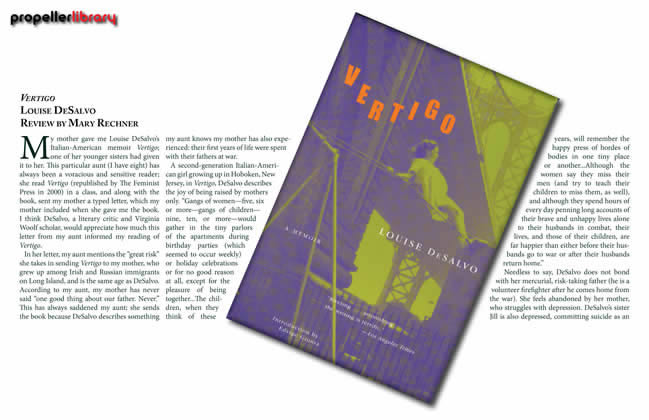
from the April 2011 issue
Vertigo
by Louise DeSalvo
Review by Mary Rechner
My mother gave me Louise DeSalvo’s Italian-American memoir Vertigo; one of her younger sisters had given it to her. This particular aunt (I have eight) has always been a voracious and sensitive reader; she read Vertigo (republished by The Feminist Press in 2000) in a class, and along with the book, sent my mother a typed letter, which my mother included when she gave me the book. I think DeSalvo, a literary critic and Virginia Woolf scholar, would appreciate how much this letter from my aunt informed my reading of Vertigo.
In her letter, my aunt mentions the “great risk” she takes in sending Vertigo to my mother, who grew up among Irish and Russian immigrants on Long Island, and is the same age as DeSalvo. According to my aunt, my mother has never said “one good thing about our father. Never.” This has always saddened my aunt; she sends the book because DeSalvo describes something my aunt knows my mother has also experienced: their first years of life were spent with their fathers at war.
A second-generation Italian-American girl growing up in Hoboken, New Jersey, in Vertigo, DeSalvo describes the joy of being raised by mothers only. “Gangs of women—five, six or more—gangs of children—nine, ten, or more—would gather in the tiny parlors of the apartments during birthday parties (which seemed to occur weekly) or holiday celebrations or for no good reason at all, except for the pleasure of being together...The children, when they think of these years, will remember the happy press of hordes of bodies in one tiny place or another...Although the women say they miss their men (and try to teach their children to miss them, as well), and although they spend hours of every day penning long accounts of their brave and unhappy lives alone to their husbands in combat, their lives, and those of their children, are far happier than either before their husbands go to war or after their husbands return home.”
Needless to say, DeSalvo does not bond with her mercurial, risk-taking father (he is a volunteer firefighter after he comes home from the war). She feels abandoned by her mother, who struggles with depression. DeSalvo’s sister Jill is also depressed, committing suicide as an adult. Family life is more confusing than sustaining.
DeSalvo finds refuge in books and relationships outside her family, and chronicles the moments of discovery that lead her to the life of a scholar, many of which occur in her high school English classes. One such English teacher, Mrs. Purdy, wants students to tell her what’s going on in Shakespeare’s “Sonnet 87,” particularly the lines, “Thyself thou gavest,” and “Thus have I had thee.” DeSalvo, who spends several chapters detailing her sex life from grade nine forward, spells it out for Mrs. Purdy: “It’s about having sex.”
Talking about sex in her English class leads DeSalvo to her young life’s most important epiphany: “In this moment, my hidden life of love and sex counts for something academically. It is transformed into something valuable beyond itself. Something I can draw on to understand literature. I can understand my life and transform its meaning because of what Shakespeare says; but I can understand Shakespeare better because of my life.”
In Vertigo, DeSalvo weaves her professional quest to explore Virgina Woolf’s life and work (including her sexual abuse), with personal memories of her own abuse (at the hands of an aunt), her mother’s depression, her father’s temper, and her sister’s suicide. DeSalvo’s exploration of Jill’s suicide lacks the resolution the rest of the memoir communicates; perhaps this is due to DeSalvo’s own lack of clarity about Jill’s struggle with mental illness.
Like DeSalvo, my mother spent her first years with her mother. With her father at war, she was “the queen” of the house, but after he returned—and after eleven other siblings were born—my mother’s claim on her own mother’s time and energy must have grown ever smaller. Unlike DeSalvo, my mother always got along well with her mother, but perhaps she, like DeSalvo, “never forgave [her] father for coming back from the war.”
Or perhaps it was only my mother-as-a-child who did not forgive her father. My aunt worried that her letter and Vertigo would upset my mother, but my mother took the book and letter as an opportunity to examine and share her life—much like the adult Louise, whose complex portrait of her father in Vertigo demonstrates something like forgiveness. Ω
Mary Rechner is the author of the story collection Nine Simple Patterns for Complicated Women (Propeller Books). She directs the Writers in the Schools program in Portland, Oregon.











